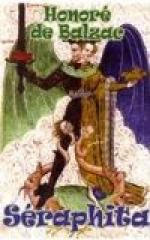These words were followed by a moment’s silence.
“Ah, truly!” said Wilfrid, “she has nothing in common with the creatures who grovel upon this earth.”
“On the Falberg!” said the old pastor, “how could you get there?”
“I do not know,” replied Minna; “the way is like a dream to me, of which no more than a memory remains. Perhaps I should hardly believe that I had been there were it not for this tangible proof.”
She drew the flower from her bosom and showed it to them. All three gazed at the pretty saxifrage, which was still fresh, and now shone in the light of the two lamps like a third luminary.
“This is indeed supernatural,” said the old man, astounded at the sight of a flower blooming in winter.
“A mystery!” cried Wilfrid, intoxicated with its perfume.
“The flower makes me giddy,” said Minna; “I fancy I still hear that voice,—the music of thought; that I still see the light of that look, which is Love.”
“I implore you, my dear Monsieur Becker, tell me the history of Seraphita,—enigmatical human flower,—whose image is before us in this mysterious bloom.”
“My dear friend,” said the old man, emitting a puff of smoke, “to explain the birth of that being it is absolutely necessary that I disperse the clouds which envelop the most obscure of Christian doctrines. It is not easy to make myself clear when speaking of that incomprehensible revelation,—the last effulgence of faith that has shone upon our lump of mud. Do you know Swedenborg?”
“By name only,—of him, of his books, and his religion I know nothing.”
“Then I must relate to you the whole chronicle of Swedenborg.”
CHAPTER III
Seraphita-Seraphitus
After a pause, during which the pastor seemed to be gathering his recollections, he continued in the following words:—
“Emanuel Swedenborg was born at Upsala in Sweden, in the month of January, 1688, according to various authors,—in 1689, according to his epitaph. His father was Bishop of Skara. Swedenborg lived eighty-five years; his death occurred in London, March 29, 1772. I use that term to convey the idea of a simple change of state. According to his disciples, Swedenborg was seen at Jarvis and in Paris after that date. Allow me, my dear Monsieur Wilfrid,” said Monsieur Becker, making a gesture to prevent all interruption, “I relate these facts without either affirming or denying them. Listen; afterwards you can think and say what you like. I will inform you when I judge, criticise, and discuss these doctrines, so as to keep clearly in view my own intellectual neutrality between him and Reason.




